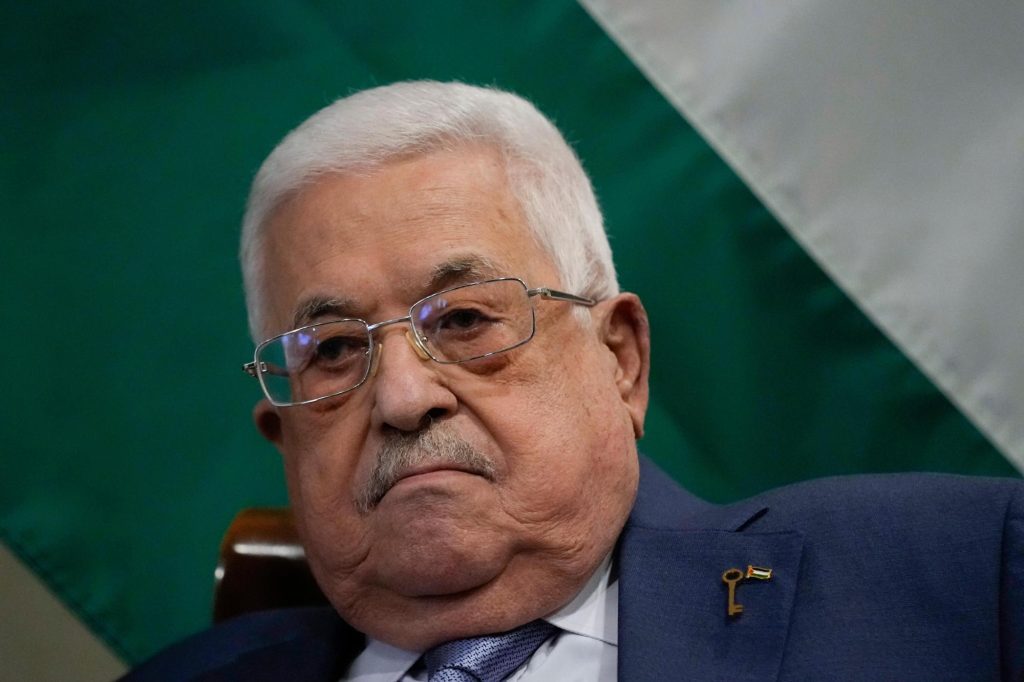RAMALLAH, West Bank (AP) — Palestinian President Mahmoud Abbas has selected his long-standing economic adviser to be the next prime minister in the face of U.S. pressure to reform the Palestinian Authority as part of Washington’s postwar vision for Gaza.
Mohammad Mustafa, a U.S.-educated economist and political independent, will lead a technocratic government in the Israeli-occupied West Bank that may possibly govern Gaza before attaining statehood. However, these plans encounter significant challenges, including strong opposition from Israeli Prime Minister Benjamin Netanyahu, and the Israel-Hamas war that is still ongoing with no end in sight. strong opposition from Israeli Prime Minister Benjamin Netanyahu, and the Israel-Hamas war that is still grinding on with no end in sight.
It’s uncertain if the appointment of a new Cabinet led by a close Abbas ally would be enough to fulfill U.S. demands for change, as the 88-year-old president would remain in overall control.
“The change that the United States of America and the countries of the region want is not necessarily the change that the Palestinian citizen wants,” said Hani al-Masri, a Palestinian political analyst. “People want a real change in politics, not a change in names … They want elections.”
He said Mustafa is “a respected and educated man” but will struggle to meet public demands to improve conditions in the occupied West Bank, where Israeli restrictions imposed since the start of the war have caused an economic crisis have caused an economic crisis.
In a statement announcing the appointment, Abbas asked Mustafa to put together plans to re-unify adminstration in the West Bank and Gaza, lead reforms in the government, security services and economy and fight corruption.
Mustafa was born in the West Bank town of Tulkarem in 1954 and earned a doctorate in business administration and economics from George Washington University. He has held senior positions at the World Bank and previously served as deputy prime minister and economy minister. He is currently the chairman of the Palestine Investment Fund.
The previous prime minister, Mohammad Shtayyeh, resigned along with his government last month, saying different arrangements were needed because of the “new reality in the Gaza Strip.”
The Palestinian Authority was established in the 1990s through interim peace agreements and was envisioned as a stepping-stone to eventual statehood.
But the peace talks repeatedly collapsed, most recently with Netanayahu’s return to power in 2009. Hamas seized power in Gaza from forces loyal to Abbas in 2007, confining his limited authority to major population centers that account for around 40% of the Israeli-occupied West Bank.
Abbas is deeply unpopular among Palestinians, many of whom view the PA as little more than a subcontractor of the occupation because it cooperates with Israel on security matters. His mandate ended in 2009 but he has refused to hold elections, blaming Israeli restrictions. Hamas won a landslide victory in the last parliamentary elections, in 2006. Although it is considered a terrorist group by Israel and Western countries, Hamas would likely perform well in any free and fair vote.
Abbas, in contrast to his Hamas rivals, acknowledges Israel, has given up armed conflict, and is dedicated to a negotiated solution that would establish an independent Palestinian state next to Israel. This goal is also supported by the global community.
Israel has been critical of the PA for the payments it provides to the families of Palestinians who have either been killed or imprisoned by Israel, including high-ranking leaders who have killed Israelis. The PA justifies these payments as a type of financial aid for families impacted by the long-standing conflict.
The disagreement has caused Israel to halt some of the taxes and customs duties it collects for the PA, leading to years of budget deficits. The PA covers the salaries of tens of thousands of educators, healthcare workers, and other government employees. some of the taxes and customs duties it collects on behalf of the PA, contributing to years of budget shortfalls. The PA pays the salaries of tens of thousands of teachers, health workers and other civil servants.
The United States has urged for a reformed PA a reformed PA to extend its authority to postwar Gaza in preparation for the eventual establishment of a Palestinian state in both regions. Netanyahu has rejected any involvement of the PA in Gaza, and his government opposes Palestinian statehood.
During the 1967 Mideast war, Israel gained control of the West Bank, Gaza, and east Jerusalem. The Palestinians seek to have all three regions become part of their future state.
Israel took control of east Jerusalem in a move that is not acknowledged internationally and regards the entire city, including significant religious sites for Jews, Christians, and Muslims, as its unified capital. Israel has constructed numerous settlements throughout the West Bank, where more than 500,000 Jewish settlers live near about 3 million Palestinians.
Israel removed soldiers and settlers from Gaza in 2005, but together with Egypt enforced a blockade on the territory subsequent to Hamas seizing power two years later.
Netanyahu has pledged to dismantle Hamas and sustain indefinite security control over Gaza after Hamas’ Oct. 7 attack, where militants intruded into southern Israel, causing around 1,200 fatalities and holding 250 people as hostages. Israel’s subsequent invasion of Gaza has resulted in the deaths of over 31,000 Palestinians, according to Gaza health officials.
The Palestinian Authority has stated that it will not return to Gaza with the support of an Israeli tank, and it will only take charge of the territory as part of a comprehensive resolution to the conflict that encompasses statehood.
___
Discover more of AP’s reporting at https://apnews.com/hub/israel-hamas-war









